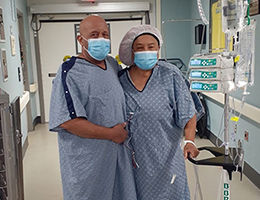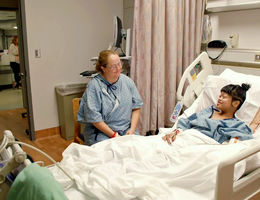We’re Stronger Together
With your help, we can make ambitious innovations in clinical care and education for our community.
Most transplant kidneys come from people who have passed away or whose families gave permission for organ donation. But some organs are donated from family members or loved ones as part of our Living Donor program.
To donate a kidney, you do not need to be related to the transplant patient. However, a blood-related family member is more likely to be a good match. Whether a blood-relative, spouse, in-law or close friend, all living donor transplants tend to have successful outcomes.
Both the recipient and potential donor have three blood tests to see if they are a match. If they are compatible, additional testing is done. If testing shows the recipient and donor are compatible and healthy enough for surgery, a date for the transplant is set.
One to two weeks prior to surgery, a final physical examination and routine tests are performed to ensure both donor and recipient are healthy and remain compatible. On the day of transplant surgery, the donor and recipient are admitted to the hospital at the same time.
The kidney transplant team will perform a hand-assisted laparoscopic donor nephrectomy, a major operation to safely remove the kidney. The surgery takes approximately four hours and is performed under general anesthesia.
The surgeon inserts a tiny camera and slim surgical instruments through four small holes into the donor's abdomen. With these instruments, the surgeon detaches the kidney, arteries, veins and ureter. The kidney is removed through a small incision (approximately 2 1/2 inches).
This cutting-edge technique reduces recovery time and pain for the donor. The recipient’s transplant operation will immediately follow the donor nephrectomy. This may take place in an adjoining operating room.
After surgery, the donor is taken to the recovery room and then the transplant unit. On average, the donor will remain in the hospital for three days.
Everyone recovers differently. Most donors heal quickly and have an uncomplicated course of recovery. Others may experience some discomfort around the incision site and a general feeling of tiredness following surgery. This is the body's natural reaction to surgery and it will improve in time.
Please contact our Living Donor Team at 909-558-3690 for more information.


With your help, we can make ambitious innovations in clinical care and education for our community.